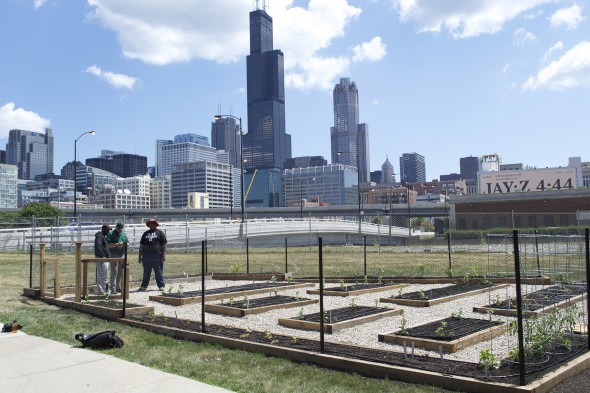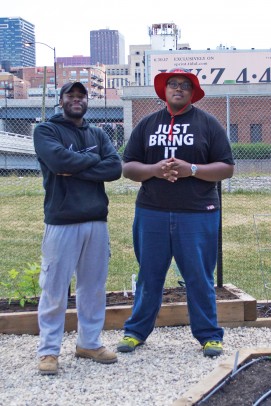Urban garden addresses food insecurity
By Robert Schroeder — rschroe9@uic.edu
The corner of Harrison and Halsted streets doesn’t feel very rural, with traffic buzzing by the busy intersection and the Willis Tower looming in the background. But that will soon change.
Students Dorrian Neeley and Lashawn Evans, both in the undergraduate Human Development and Learning program in the College of Education, have developed UIC’s first urban garden at the intersection, aiming to address issues of sustainability and food security in low-income Chicago communities.
“Growing up in Chicago, we both know what living off the corner store can do for you,” Neeley said. “We think we can influence the community starting with this garden and hopefully expanding, so people can have the ability to feed themselves.”
Their idea blossomed in the Child and Youth Policies in Urban America course (ED 135), taught by Chris Miller, assistant clinical professor of educational policy studies. Neeley and Evans sought to study sustainable food systems as an independent project, a plan embraced by Miller and Alfred Tatum, dean of the College of Education.
During the Spring 2017 semester, Neeley and Evans registered a student organization, acquired access to the plot of land and earned funding from UIC to partner with The Organic Gardener, creators of sustainable garden-to-table organic gardens based in Highland Park. Planting finished June 27, moving the project into the next phase of raising the first harvest.
A sampling of this summer’s bounty includes tomatoes, basil, okra, Swiss chard, raspberries, carrots, pumpkins, squash, edamame, watermelon, purple potatoes and kale.
Neeley and Evans plan to sell what they raise at low costs to UIC students and at farmers markets in Chicago.
“There are so many things you can’t control in your life, but nutrition and what you eat can give you so much agency over your health,” Evans said.
“We want to give people that level of control.”
As future educators, Neeley and Evans see urban gardening efforts as key cogs in community growth.
“You need to learn how to sustain yourself,” Neeley said. “If you can do that by growing plants in your own garden, a community garden or a community center, you’ll educate yourself and those who live around you. You’ll make your community better overall.”


